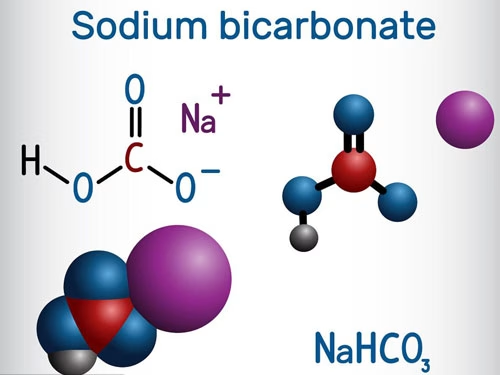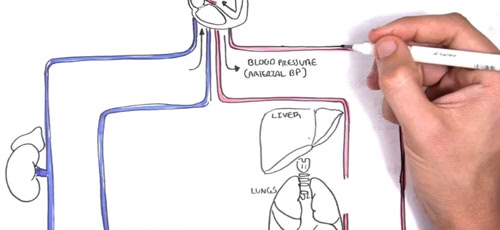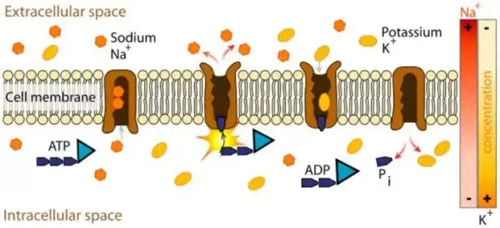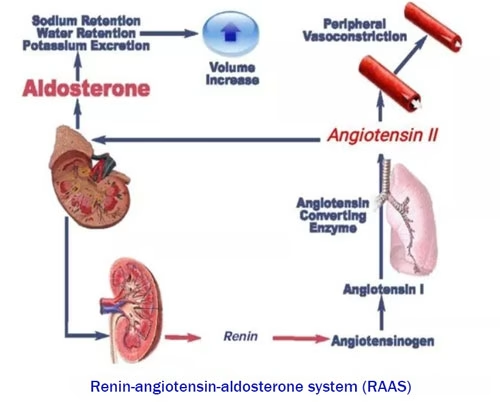I. Introduction
In the realm of health and nutrition, questions often arise about the potential impacts of common substances on our well-being. One such query that has garnered attention is whether sodium bicarbonate, a familiar compound known to many as baking soda, can influence blood pressure. Given the crucial role that blood pressure plays in maintaining overall health, understanding the relationship between sodium bicarbonate and blood pressure is of great significance.

High blood pressure, or hypertension, is a silent yet pervasive health issue that can lead to a host of serious complications, including heart disease, stroke, and kidney problems. Conversely, low blood pressure, or hypotension, can also cause dizziness, fainting, and in severe cases, inadequate blood flow to vital organs. In this context, exploring whether a seemingly innocuous substance like sodium bicarbonate can tip the scales in either direction becomes not just a matter of scientific curiosity but a practical concern for anyone looking to safeguard their health. As we delve deeper into this topic, we will sift through the available evidence, consider different perspectives, and aim to arrive at a more comprehensive understanding of the potential connection between sodium bicarbonate and blood pressure.
II. Understanding Sodium Bicarbonate
Sodium bicarbonate, chemically represented as NaHCO3, is a white crystalline powder or granular substance that is odorless and has a slightly alkaline taste. Its play an important role in our daily lives, and used in many fields. Please click “what is sodium bicarbonate” for the explanations on its properties and uses. Given its ubiquity and versatility, understanding its potential effects on our health, particularly on blood pressure, becomes all the more relevant.

III. The Mechanism of Blood Pressure Regulation
A. The Basics of Blood Pressure
Blood pressure, in essence, is the force exerted by the circulating blood against the walls of the arteries. It is a crucial physiological parameter that reflects the dynamic state of the cardiovascular system. Systolic blood pressure (SBP), commonly known as the “upper number” or “high pressure,” represents the peak pressure within the arteries when the heart contracts and pumps blood out. Diastolic blood pressure (DBP), the “lower number” or “low pressure,” indicates the lowest pressure in the arteries when the heart is at rest between beats. For a healthy adult at rest, the typical blood pressure reading is around 120/80 mmHg, with 120 mmHg being the systolic pressure and 80 mmHg the diastolic pressure. However, it’s important to note that blood pressure is not a static value; it can fluctuate throughout the day due to various factors, such as physical activity, stress levels, and even the time of day.

The maintenance of normal blood pressure is vital for the proper functioning of the body. Adequate blood pressure ensures that all organs and tissues receive a sufficient supply of oxygen and nutrients. The heart, being the central pump, plays a pivotal role in generating the force necessary to propel blood through the circulatory system. Blood vessels, including arteries, veins, and capillaries, work in tandem to distribute the blood and regulate its flow. When blood pressure deviates from the normal range, either too high or too low, it can have far-reaching consequences for health. High blood pressure can put excessive strain on the heart and blood vessels, leading to damage over time and increasing the risk of cardiovascular diseases. Conversely, low blood pressure may result in inadequate perfusion of vital organs, causing symptoms like dizziness, fainting, and in severe cases, organ failure.
B. Factors Influencing Blood Pressure
Numerous factors can influence blood pressure levels. Lifestyle choices are among the most significant contributors. Unhealthy habits such as a sedentary lifestyle, excessive alcohol consumption, and smoking can all lead to elevated blood pressure. A lack of regular physical activity means the heart and blood vessels don’t get the conditioning they need, leading to weakened vascular function. Alcohol, when consumed in excess, can disrupt the normal hormonal regulation of blood pressure, while smoking damages the blood vessel walls, increasing their resistance to blood flow.

Diet also plays a critical role. High sodium intake is a well-known culprit in hypertension. Sodium causes the body to retain water, increasing blood volume and subsequently raising blood pressure. Processed and fast foods are often laden with sodium, making them a common dietary pitfall. On the other hand, a diet rich in potassium, found abundantly in fruits and vegetables, can help counteract the effects of sodium and promote lower blood pressure. Additionally, factors like stress can have a profound impact. In response to stress, the body releases stress hormones, which can cause blood vessels to constrict and blood pressure to spike.
Genetics also predispose individuals to certain blood pressure patterns. If there is a family history of hypertension, one is at a higher risk of developing high blood pressure. Age is another factor, as blood vessels tend to lose their elasticity over time, leading to increased resistance and potentially higher blood pressure. Medical conditions such as kidney disease, hormonal disorders, and obesity can also disrupt the normal regulation of blood pressure. Understanding these multifaceted factors is essential as we explore the potential link between sodium bicarbonate and blood pressure, as they can all interact in complex ways to influence the final outcome.
IV. The Research on Sodium Bicarbonate and Blood Pressure
A. Animal Studies
In the pursuit of understanding the relationship between sodium bicarbonate and blood pressure, researchers have turned to animal models. These studies provide valuable insights, albeit with the caveat that animal physiology and responses can differ from those of humans. In one study, rats were divided into groups and administered varying doses of sodium bicarbonate over a specific period. The researchers closely monitored the rats’ blood pressure, heart rate, and other relevant physiological parameters. Interestingly, in some groups, a modest increase in blood pressure was observed. This was accompanied by changes in the renin-angiotensin-aldosterone system (RAAS), a key hormonal regulator of blood pressure in the body. The sodium load from the bicarbonate was thought to trigger a cascade of events within this system, leading to vasoconstriction and subsequent blood pressure elevation.

Another investigation focused on the effects of long-term, low-dose sodium bicarbonate supplementation in mice. Over several months, the mice received carefully measured amounts of the compound in their diet. At the end of the study, while the overall blood pressure changes were not drastic, there were alterations in the elasticity of the blood vessels. The vessel walls appeared to have a reduced ability to dilate and contract in response to physiological demands, which could potentially have implications for blood pressure regulation over time. These findings in mice suggest that even seemingly small and chronic exposures to sodium bicarbonate might have subtle, yet important, effects on the cardiovascular system.
B. Human Clinical Trials
Human clinical trials offer a more direct look at the impact of sodium bicarbonate on blood pressure. In a study involving healthy volunteers, participants were randomly assigned to receive either a placebo or a sodium bicarbonate supplement for a set duration. Their blood pressure was measured at regular intervals throughout the trial. The results were somewhat mixed. In the short term, there was no significant difference in blood pressure between the two groups. However, as the study progressed and the supplementation continued, a small subset of participants in the sodium bicarbonate group showed a mild increase in systolic blood pressure. This led researchers to hypothesize that individual variations in metabolism and renal function might play a crucial role in determining one’s susceptibility to blood pressure changes induced by sodium bicarbonate.

In a separate trial that focused on individuals with pre-existing hypertension, the stakes were even higher. These patients were already managing their blood pressure through lifestyle modifications and, in some cases, medication. The addition of sodium bicarbonate to their regimen was carefully monitored. Some patients experienced a blunting of the effectiveness of their antihypertensive medications when taking sodium bicarbonate concurrently. It was postulated that the alkalizing effect of the compound might interfere with the pharmacodynamics of the drugs, altering their ability to lower blood pressure as intended. This highlights the importance of considering potential interactions when using sodium bicarbonate, especially in patients with existing health conditions. Overall, while human clinical trials have provided valuable data, they also emphasize the complexity of the relationship between sodium bicarbonate and blood pressure, with many factors at play that can influence the outcome.
V. The Possible Mechanisms Behind the Link
A. Sodium and Fluid Balance
At the heart of the matter lies the sodium component of sodium bicarbonate. Sodium is a well-known player in the body’s fluid and electrolyte balance. When we consume sodium bicarbonate, the sodium ions are absorbed into the bloodstream. This influx of sodium can disrupt the delicate equilibrium that the body maintains to regulate fluid levels.

The kidneys, which are the body’s primary filtration system, respond to the increased sodium load. They attempt to excrete the excess sodium, but in the process, they also retain water. This phenomenon, known as sodium-water retention, leads to an expansion of the extracellular fluid volume, which includes the blood plasma. As the blood volume increases, the heart has to work harder to pump the additional fluid through the circulatory system. This increased workload on the heart and the augmented blood volume combine to exert greater pressure on the arterial walls, potentially leading to a rise in blood pressure.
B. Hormonal Responses
Beyond the direct effects on fluid balance, sodium bicarbonate can also trigger a cascade of hormonal responses that influence blood pressure. One of the key hormonal systems involved is the renin-angiotensin-aldosterone system (RAAS). When sodium levels in the body change, as they do with the ingestion of sodium bicarbonate, it can be detected by specialized cells in the kidneys. These cells respond by secreting renin, an enzyme that sets off a series of reactions. Renin acts on a protein called angiotensinogen, converting it to angiotensin I. Subsequently, angiotensin I is further converted to angiotensin II by the action of the angiotensin-converting enzyme (ACE). Angiotensin II is a potent vasoconstrictor, meaning it narrows the blood vessels, increasing resistance to blood flow and thereby elevating blood pressure. Additionally, it stimulates the release of aldosterone from the adrenal glands. Aldosterone promotes sodium reabsorption in the kidneys, further exacerbating the sodium and fluid retention issue and contributing to the upward pressure on blood pressure.

The sympathetic nervous system also enters the fray. The increased sodium intake from sodium bicarbonate can activate this system, leading to the release of stress hormones like adrenaline and noradrenaline. These hormones cause the heart to beat faster and with more force, and they also prompt the blood vessels to constrict. The combined effect is a spike in blood pressure. Over time, chronic activation of these hormonal pathways due to repeated or excessive consumption of sodium bicarbonate can have a cumulative impact, gradually pushing blood pressure levels higher and increasing the risk of hypertension and related cardiovascular problems. Understanding these intricate hormonal feedback loops is crucial in deciphering the full scope of how sodium bicarbonate might influence blood pressure.
VI. Considerations and Limitations
It’s crucial to note that the relationship between sodium bicarbonate and blood pressure is not one-size-fits-all. Individual responses can vary widely based on several factors. People with pre-existing kidney conditions, for instance, may be more sensitive to the sodium load from sodium bicarbonate. The kidneys play a pivotal role in regulating sodium and fluid balance, and if their function is compromised, the potential for blood pressure changes may be amplified. Additionally, those on certain medications, especially antihypertensive drugs, need to be vigilant. As seen in some clinical trials, the concurrent use of sodium bicarbonate and blood pressure medications can lead to unexpected interactions, either reducing the efficacy of the drugs or causing unforeseen changes in blood pressure.

Moreover, the current body of research has its own set of limitations. Many animal studies, while providing valuable initial insights, cannot fully replicate the complex physiological and lifestyle factors at play in humans. The dosages and durations of sodium bicarbonate administration in these studies may not directly translate to real-world scenarios. In human clinical trials, sample sizes are often relatively small, limiting the statistical power to draw definitive conclusions. The relatively short duration of some trials also means that long-term effects may go undetected. There is a need for more extensive, long-term studies that take into account diverse populations, including those with different health backgrounds and genetic profiles, to truly unravel the full spectrum of how sodium bicarbonate might impact blood pressure. Only then can we offer more comprehensive and personalized recommendations.
VII. Recommendations and Precautions
A. For General Population
For the average person without underlying health issues, using sodium bicarbonate in moderation is key. When using it for common household purposes like baking or minor personal care applications, the amounts involved are typically small and pose little risk. However, if considering it for more regular use, such as for self-medication to address occasional heartburn or acid reflux, it’s essential to follow the recommended dosages on the product label or as advised by a healthcare professional. For example, if using over-the-counter sodium bicarbonate tablets for stomach discomfort, adults usually take one to two tablets, not exceeding a certain frequency, say three times a day. It’s also crucial to pay attention to any changes in how you feel after using it. If you notice any unusual symptoms like increased thirst, swelling in the extremities, or a persistent change in blood pressure (if you happen to measure it), it could be an indication that your body is reacting to the sodium load. In such cases, it’s advisable to discontinue use and consult a doctor.

B. For People with Hypertension or Other Health Conditions
For individuals with hypertension, diabetes, kidney disease, or other chronic health problems, the stakes are higher when it comes to using sodium bicarbonate. These patients should never start using sodium bicarbonate without first consulting their doctor. The doctor will consider various factors, such as the current state of the patient’s health, the medications they are already taking, and the potential risks versus benefits. For instance, a hypertensive patient on multiple blood pressure medications may find that sodium bicarbonate interferes with the effectiveness of their drugs, as seen in some clinical trials. In such a situation, the doctor might adjust the medication regimen or recommend alternative solutions for any associated issues like acid reflux. Self-monitoring of blood pressure is also of utmost importance. If you have hypertension and decide to use sodium bicarbonate under medical guidance, keep a close eye on your blood pressure readings. Use a reliable home blood pressure monitor and record the values at the same time each day. If you notice any upward trends or significant fluctuations, inform your doctor immediately. This way, any potential problems can be detected and addressed early, safeguarding your long-term health.
VIII. Conclusion
In conclusion, the relationship between sodium bicarbonate and blood pressure is complex and multifaceted. While some studies suggest a potential link, with sodium bicarbonate potentially leading to an increase in blood pressure through mechanisms involving sodium and fluid balance and hormonal responses, the evidence is not conclusive. Individual factors, such as pre-existing health conditions and genetic predispositions, play a significant role in determining one’s response to sodium bicarbonate. It is essential for the general population to use sodium bicarbonate judiciously, especially those with underlying health issues, who should consult their healthcare providers before using it. As research in this area continues to evolve, staying informed about the latest findings will be crucial for making well-informed decisions about our health. By maintaining a balanced lifestyle, including a healthy diet, regular physical activity, and appropriate medical management when needed, we can better safeguard our cardiovascular health and overall well-being in the face of the potential impacts of substances like sodium bicarbonate.
Expand reading:

